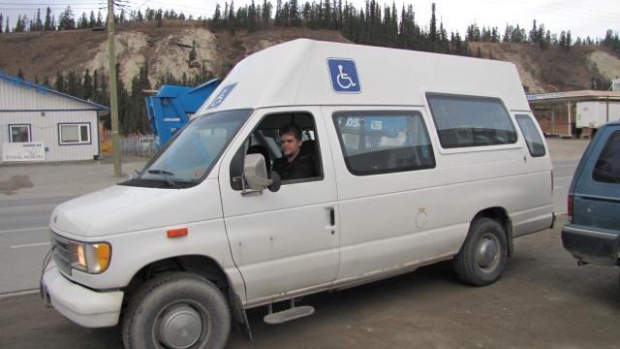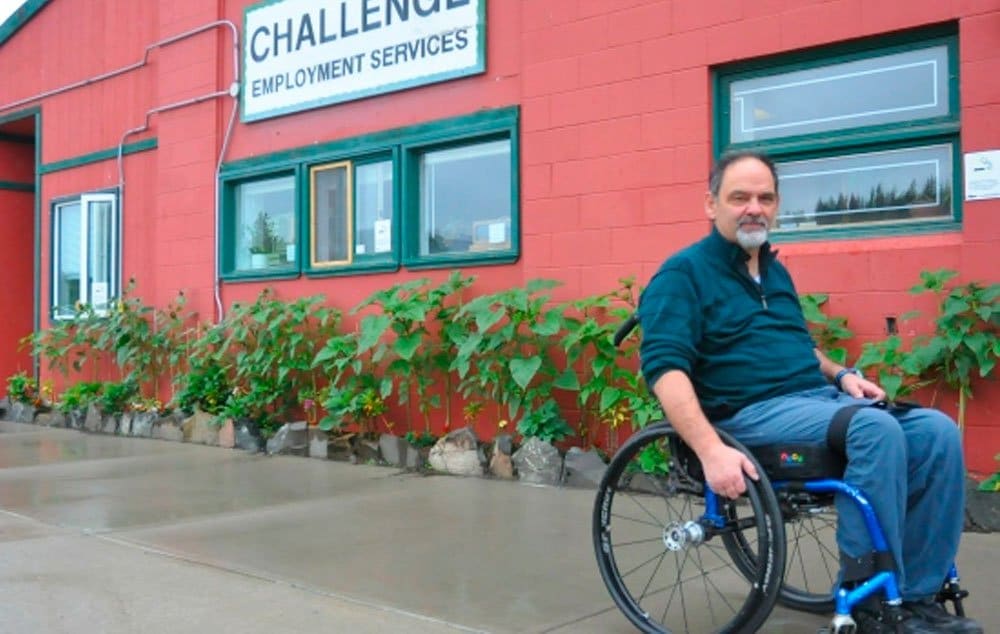Two years from now, the City of Whitehorse will require taxi companies to serve people who use wheelchairs.
The city’s vehicle for hire bylaw, updated on Monday, states that by May 2017 “every vehicle-for-hire company shall have a minimum of one accessible vehicle available for hire during all hours the company is in operation.”
And they must charge the same price.
Only one company in Whitehorse, Premier Cabs, currently has a wheelchair-accessible taxi vehicle through a subcontractor. The van, which must be booked in advance, has limited hours and charges higher rates. The City of Whitehorse also offers a public transit service called HandyBus as well as wheelchair-accessible public buses.
Rick Goodfellow, executive director of Challenge Community Vocational Alternatives, which advocates for people with disabilities, had advocated for change. He says accessibility is a human rights issue.
“In the winter the bus stops, you can’t get to a bus stop to begin with,” Goodfellow says.
“Compound that with the fact that you’ve only got vehicles running during transit hours. What happens if somebody wants to go to a movie? What happens if someone wants to go to the bar with their buddies? They need a ride home at midnight. What about the woman who is being abused or someone who has problems at 2 o’clock in the morning?
“Any public service is supposed to have a level playing field.”
 This wheelchair-accessible taxi is available in Whitehorse but during limited hours. The City of Whitehorse will soon require every vehicle-for-hire company to have at least one accessible vehicle available during all hours of operation.
This wheelchair-accessible taxi is available in Whitehorse but during limited hours. The City of Whitehorse will soon require every vehicle-for-hire company to have at least one accessible vehicle available during all hours of operation.
Companies can share vehicles
Whitehorse is served by at least six different taxi companies. The new bylaw will allow them to share wheelchair-accessible vehicles.
“That lowers the cost,” said Dave Pruden, bylaw manager with the City of Whitehorse.
Anson Zhen, the owner of Victory Cab, says he believes the bylaw comes from good intentions, but says “it’s not going to work.” He’s skeptical that companies will want to share a vehicle.
“Who is going to pay for the maintenance? Who’s in charge of that van?”
Zhen also says he does not believe there is enough demand in Whitehorse to justify accessible service around the clock by all companies.
“In [Whitehorse] we only have about 25,000 people. How many people [with disabilities] are we having? We don’t have many calls.”
Still, he says his company will look for an accessible vehicle.
“I’ll probably get a used one just to get around the bylaw.”
Whitehorse man died after being stranded
The city’s discussion about accessibility and transit comes after the death of 44-year-old Ronald Dennis Itsi.
The quadriplegic man died December 7, 2014 of complications from a urinary tract infection.
The Yukon coroner’s report notes that Itsi was visiting a friend but was unable to find a wheelchair-accessible taxi to bring him back to his continuing care facility on a Sunday night.
At that time, the city’s Handy Bus service was unavailable and regular city buses were not running.
Itsi died overnight at the friend’s house.
Chief coroner Kirsten Macdonald’s report notes: “if Mr. Itsi had been able to return to Copper Ridge Place and the nursing staff had identified the symptoms, they would have contacted the physician.”
About the wheelchair-accessible cab service in Whitehorse, Macdonald noted its “hours of availability are inconsistent and somewhat unreliable.”
Move welcomed by some Yukoners
The bylaw change is being welcomed by some groups.
Serge Michaud of Special Olympics Yukon says he’s pleased the city is moving to ensure greater accessibility. He thinks more people who use wheelchairs will call for a taxi when their vehicles are more accessible.
“It’s pretty hard to ask for something when it’s not available. Whereas once it’s available, I really believe there is going to be a lot of use out of it.”
The bylaw does not apply to companies that offer limousines for charter or tourism operators such as scenic tour buses which operate outside city limits.
Source: cbcnews



